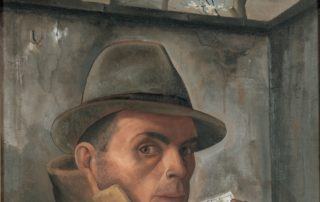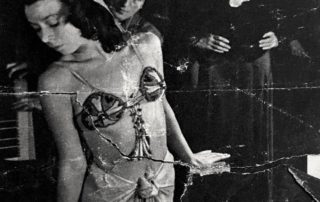Elizabeth Berkowitz2020-10-07T15:08:59-04:00September 16th, 2020|Lectures|
WATCH THE RECORDING OF THIS EVENT HERE. Lecture featuring Anne Sibylle Schwetter, Curator of the Felix Nussbaum Collection in the Felix Nussbaum House in the Osnabrück Museum Quarter, Osnabrück Moderated by Rachel Stern, Executive Director of the Fritz Ascher Society in New York The German-Jewish artist Felix Nussbaum (1904 Osnabrück - 1944 Auschwitz) started a promising career in Berlin around 1930, which ended abruptly when the National Socialists came to power in 1933. Years in exile in Italy and Belgium followed. In 1942 Nussbaum went into hiding in Brussels. The artist's last paintings were created here from June 1943 until shortly before his arrest in June 1944. A little later he was murdered in Auschwitz. Like hardly any other painter [...]
Elizabeth Berkowitz2020-09-16T19:55:58-04:00September 16th, 2020|Lectures|
View a recording of this event HERE. EXCLUSIVE: Watch Annette von Wangenheim's German language documentary film "Tanz unterm Hakenkreuz" from 2003 HERE. Big thanks to Annette von Wangenheim and Sabine Rollberg for making this possible! Gyp Schlicht speaks at 38:02 min. Lecture featuring Sabine Rollberg, Professor Emeritus of Documentary Film at the Academy of Media Arts in Cologne and former ARTE Representative and ARTE Commissioning Editor for WDR Moderated by Rachel Stern, Executive Director of the Fritz Ascher Society in New York In times of Nazi Germany, becoming an artist was not the typical career path for women. The „deutsche Frau“ was supposed to represent the “good housewife”, as a mother of many children, not wearing make-up and fancy dresses. The Nazis were refuting [...]
Rachel Stern2020-10-07T15:06:33-04:00August 31st, 2020|Events, Past Events|
WATCH THE RECORDING OF THIS EVENT HERE. Lecture featuring Anne Sibylle Schwetter, Curator of the Felix Nussbaum Collection in the Felix Nussbaum House in the Osnabrück Museum Quarter, Osnabrück Moderated by Rachel Stern, Executive Director of the Fritz Ascher Society in New York The German-Jewish artist Felix Nussbaum (1904 Osnabrück - 1944 Auschwitz) started a promising career in Berlin around 1930, which ended abruptly when the National Socialists came to power in 1933. Years in exile in Italy and Belgium followed. In 1942 Nussbaum went into hiding in Brussels. The artist's last paintings were created here from June 1943 until shortly before his arrest in June 1944. A little later he was murdered in Auschwitz. Like hardly any other painter [...]
Rachel Stern2020-09-25T07:28:27-04:00August 19th, 2020|Events, Lectures, Past Events|
View a recording this event HERE EXCLUSIVE: Watch Annette von Wangenheim's German language documentary film "Tanz unterm Hakenkreuz" from 2003 HERE. Big thanks to Annette von Wangenheim and Sabine Rollberg for making this possible! Gyp Schlicht speaks at 38:02 min. Lecture featuring Sabine Rollberg, Professor Emeritus of Documentary Film at the Academy of Media Arts in Cologne and former ARTE Representative and ARTE Commissioning Editor for WDR Moderated by Rachel Stern, Executive Director of the Fritz Ascher Society in New York In times of Nazi Germany, becoming an artist was not the typical career path for women. The „deutsche Frau“ was supposed to represent the “good housewife”, as a mother of many children, not wearing make-up and fancy dresses. The Nazis were refuting what [...]




